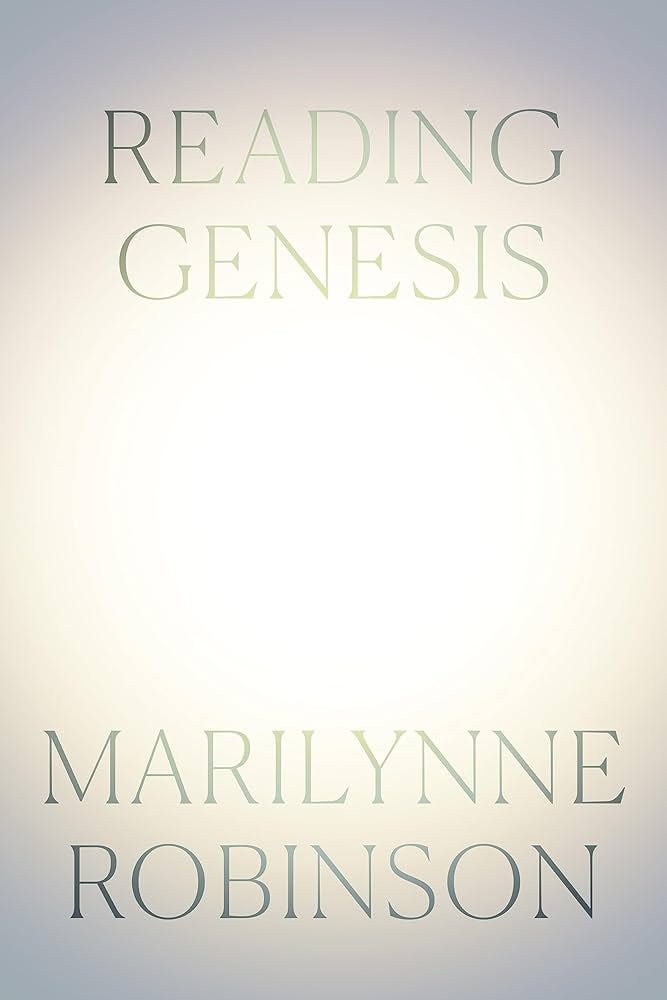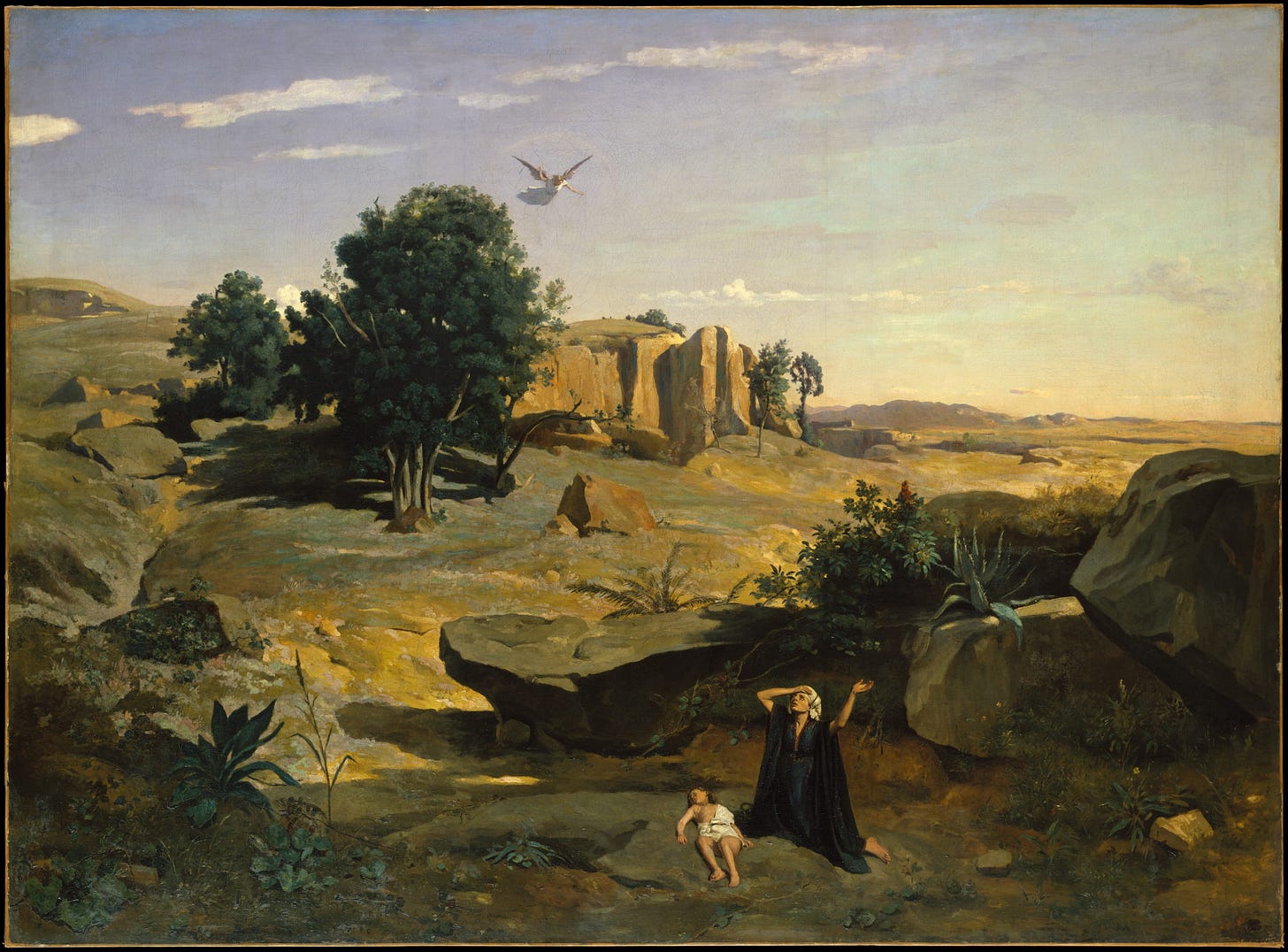Read offline and hold the world in your hands
Also: Reading Reading Genesis
I carry some childhood baggage with the King James Version of the Bible.
We grew up adjacent to a family of fundamentalists with buzz-cuts who insisted, among other things, that women shouldn’t learn how to drive, that dinosaurs still roamed the earth, that college was for boys, and that the King James Version was the only true Word of God. They, as many in their ilk, referred to it as the Authorized Version, stamped with approval by Christ Himself. All other versions were blasphemous, leading to the sin of misinterpretation and therefore probable damnation.
Having been lectured on this subject multiple times by the two sons in this family—that the Bible I was reading wasn’t the right Bible, that I may as well be reading nonsense for all the good it was doing my soul—I vowed to never read the KJV. Just to spite them and King James, I guess.
My vow has been broken. I just finished Marilynne Robinson’s new book, Reading Genesis, in which she expounds, with her novelist’s eye, the beauty and profundity of the text. And although she never says anything about an authorized version, she quotes exclusively from the KJV and reprints its translation of Genesis in its entirety.
And it is gorgeous. I’ve been missing out. I don’t believe in seven-day creationism now, but I do feel like I’ve encountered Genesis again for the first time. The stories, so familiar to me from my youth, are like new. There are so many beautiful phrases that are glossed over or translated in a dull way in NIV or other “modern” translations.
For instance, God’s blessing and command to humans (the “creation mandate”) in the KJV:
“And God blessed them, and God said unto them, Be fruitful, and multiply, and replenish the earth, and subdue it: and have dominion over the fish of the sea, and over the fowl of the air, and over every living thing that moveth upon the earth.” (Genesis 1:28, KJV)
That phrase—replenish the earth—was so new and refreshing to me. This passage has often been used as a justification for plundering, for abuse of the earth and its creatures, for ownership and territorial control. In the NIV, this command is rendered simply as:
“Be fruitful and increase in number; fill the earth and subdue it.”
That word replenish in the KJV offers up an entirely new meaning. Yes, it can mean “to fill up, to replace,” but in Webster’s 1913 dictionary, to replenish is to recover former fullness. What a different—and far more beautiful—mandate. Just that one word transforms this charge, and our orientation to the natural world, completely.
Robinson is a novelist and an amateur historian. She’s not a theologian, and she’s not trying to be. She’s not sucking the life out of Genesis by exegeting the text. She’s not sermonizing.
Instead, she looks at what kinds of stories the Babylonians and Mesopotamians were telling at the same time. How did the Hebrew writers do something different with the same plot? How was Elohim set apart from the common pantheon of Mesopotamian gods? And why does that even matter? Which mysteries does the text reveal, and which does it keep hidden?
She also asks what the “mind of the text” is telling us, why it matters that a sacred history is writ small—spun through the lives of very ordinary people who suffer from all sorts of human malaise, crime, and deception.
Robinson writes:
“Genesis can hardly be said to end. In it certain things are established—the nature of Creation and the spirit in which it was made; the nature of humankind; how and in what spirit the Creator God enters into relation with His human creatures. The whole great literature of Scripture, unfolding over centuries, will proceed on the terms established in this book. So Genesis is carried forward, in the law, in the psalms, in the prophets, itself a spectacular burst of light without antecedent but with a universe of consequences.”
Genesis sets the stage for all the stories to follow. But touchingly, it does so on a small, movingly personal and human scale. Robinson again:
“The book of Genesis begins with the emergence of Being in a burst of light and ends with the death and burial of a bitter, homesick old man. If there is any truth to modern physics, this brings us to the present moment. Disgruntled and bewildered, knowing that we derive from an inconceivably powerful and brilliant first moment, we are at a loss to find anything of it in ourselves. God loved Jacob and was loyal to him, no less for the fact that Jacob felt the days of his life, providential as they were, as deep hardship.”
We are at a loss to find anything of it in ourselves. Genesis begins that story: An intimate, omnipotent Creator, surrounded by these weak, wounded little people who are trying to sort out their lives. Robinson’s exploration of the text has refreshed my imagination for this narrative that I thought I already knew well. Instead, there’s a lifetime more to learn.
Online reading is for letters
Recent conversations at work have danced around the question: What is reading online for?
Some years ago, I made the case that longform, deep reading should happen online: Digital Readers Deserve Better.
Now I’m not so sure. I still think we deserve better-designed reading experiences online, but I’m beginning to wonder if deep reading is even possible on screens. The world wide web, in its current form, actively works against focus. I can’t read deeply on my laptop or phone; I’ve tried, and for me, it’s not feasible.
If this is the case, what are all these words on the internet FOR? The vast amounts of text on the web are astonishing; the mind reels at the sheer volume of how much we’ve accumulated and published and produced in the few decades of the world wide web’s life. Online text is a valuable repository, for sure, but as individual readers, I think it offers us something very different from paper-and-ink books.
I’ve come to believe that the best online reading that can be done is more often coming to us in an epistolary form.
There are essays online that I still want to read, but I can’t stomach much journalism these days, as I’ve already expressed, unless it’s of the very slow, long-form variety.
I’ve come to think the best online reading is for LETTERS. From a writer you want in your inbox. Increasingly, the only long thing I want to read online are emails. Good, lengthy, thoughtful emails, emails that often take the shape of essays, but emails nonetheless. Almost all of the best and most memorable online writing I’m reading these days comes from newsletters, whether from Substack or elsewhere.
There are still some good essays I’ll read online, posted by some major publications, but my attention increasingly wanes. If I really want to read and understand something deeply, I can’t do it online anymore.
I want a letter to come to me directly, and I can read it as easily and happily on my phone as on my computer, and that’s just about all I can bear to read on a screen these days.
Offline reading is for everything else
But in a happy turn of events, all of the text I consume online has only enhanced the pleasure of reading offline.
Books, physical books, are secrets I keep from the internet.
I’m always being surveilled online. But in the true world? It’s just me and a book. I can have my own thoughts without hyperlinks to someone else’s. I can make my own connections without them being made for me. I can draw conclusions without the temptation to Google a stray word or concept that has caught my fancy. (It’s for this reason that you must keep the phone far away if you are trying to read a physical book.)
I’ve been taken lately with the pleasures of a novel from the 1990s. Before everything changed. Before the internet altered everything about how we related to one another. They feel positively quaint and yet on the precipice of a great cultural upheaval.
I’m reading early Rachel Cusk, her third novel, from 1997, in which her style has not yet fully formed. It’s fussy but tight, and it feels wholly refreshing and distinct from present-day fiction. There are no looming phones. There are no websites to be visited. Perhaps I suffer from a misguided nostalgia, but it feels like a thrill to find a woman, waiting at a train station and not knowing when her ride will appear, because there’s no one to text. It’s a little like how every Seinfeld episode’s central conundrum could have been solved if mobile phones existed. It’s a delight, an interlude from the present.
Currently reading
The Country Life, Rachel Cusk
The Plot Against America, Philip Roth
Worn: A People’s History of Clothing, Sofi Thanhauser





What a lovely exploration! I've added Reading Genesis to my stack of books for the next handful of months. I knew my own share of KJV fundamentalists as a young woman, and that definitely put a poor taste in my mouth for the particular translation as well...but my mother (who was quite far from fundamentalist in many areas) loved the NKJV translation due to its easier readability in daily life while also keeping some of the poetic phrasings of the KJV version. Her appreciation has somewhat balanced with my distaste.
I agree with you on the online vs. offline reading. It's becoming increasingly challenging for me to read from a screen, all the more now that I work an office job which is comprised of 90% screen-based tasks and now that much of my ongoing coursework in continuing education has been moved online. I often finding myself printing essays or class reading to peruse fully within the physical world. It's just better that way.